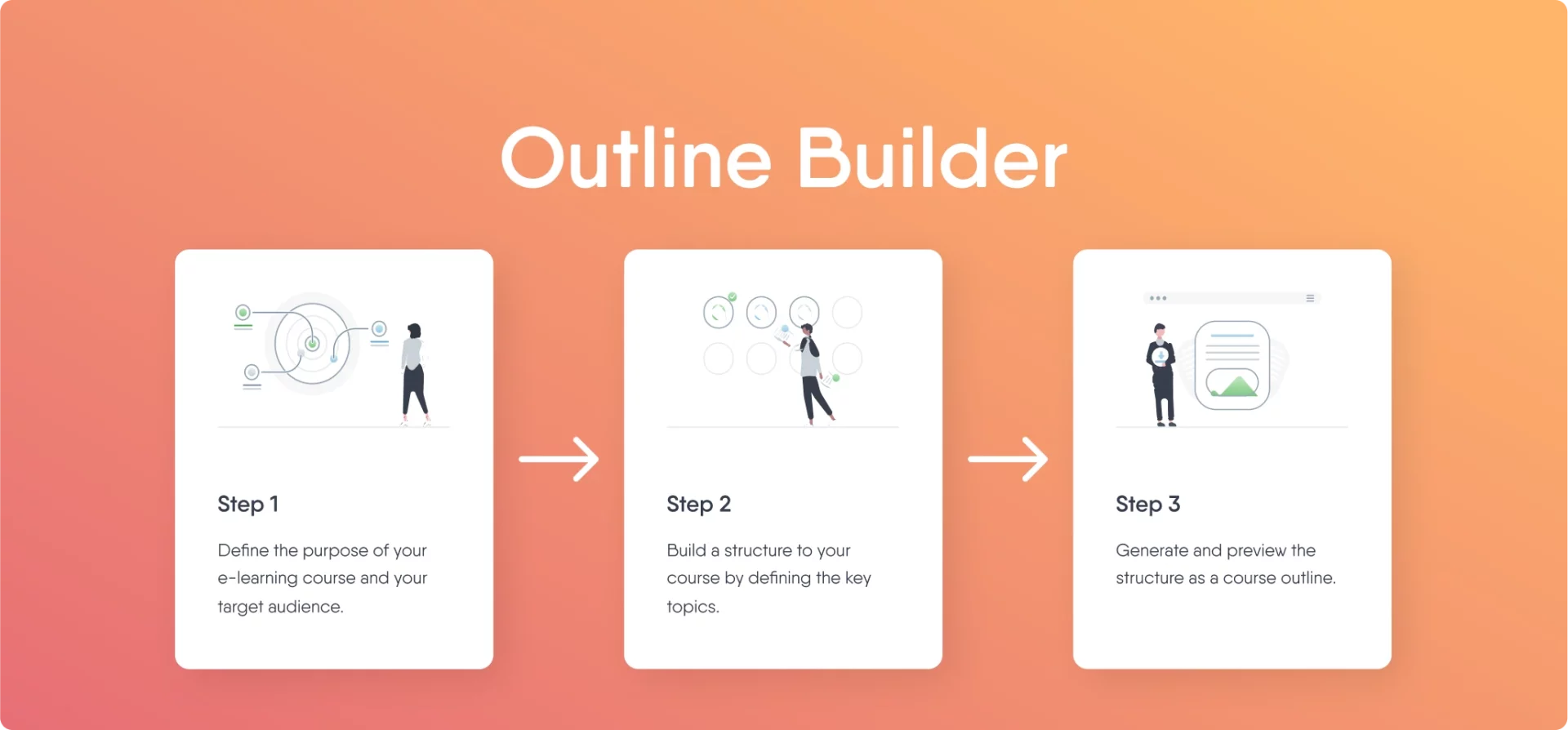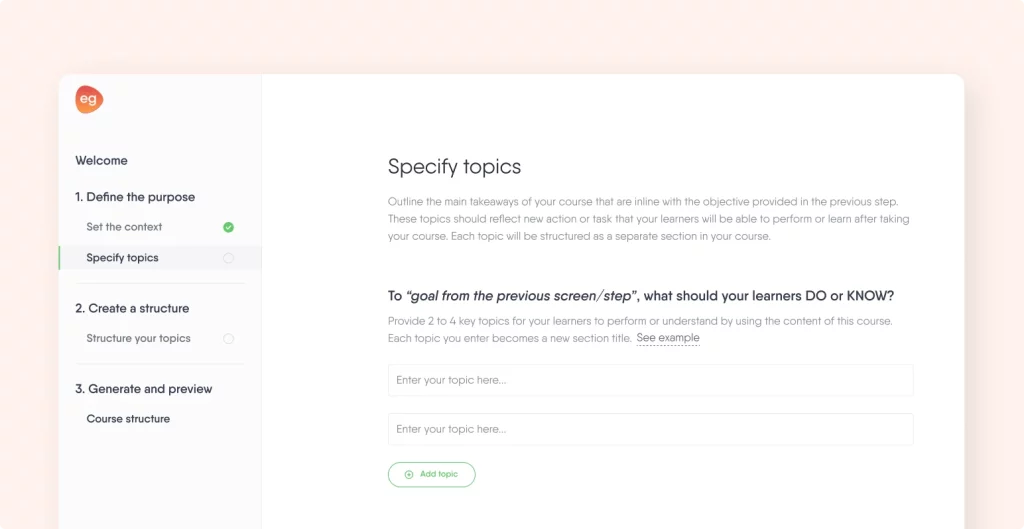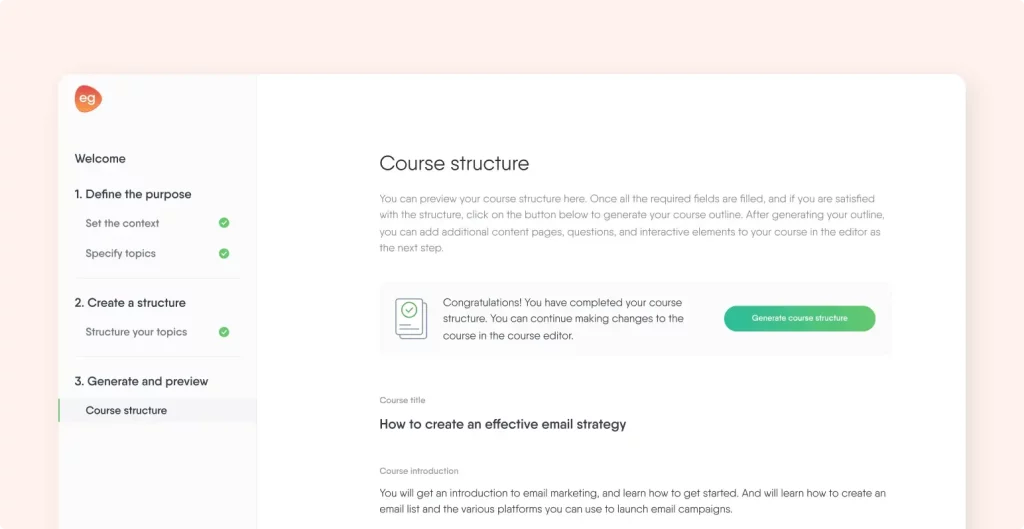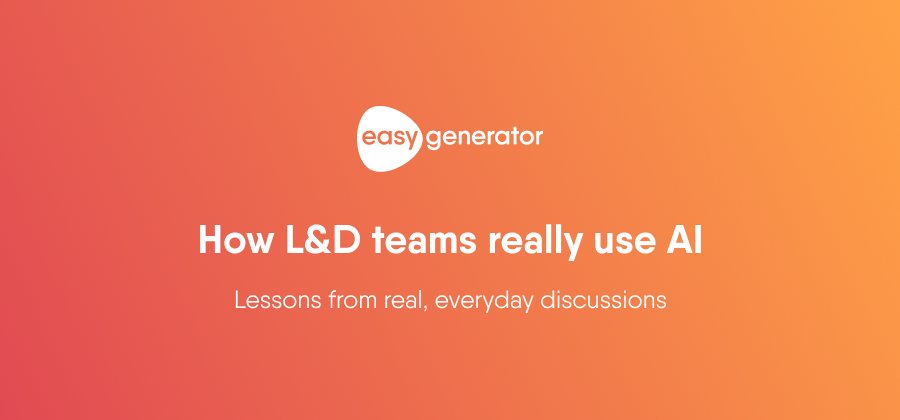Why you should build a course outline for your e-learning (and how)
Every great e-learning course begins with a solid foundation—and that foundation is the outline. Now, Easygenerator’s Outline Builder will help users create more cohesive, goal-oriented courses.

Creating an e-learning course is so much more than putting together some slides and adding a quiz at the end. It’s a process that demands careful planning, particularly when it’s an internal subject matter expert (SME) — not an L&D team — authoring the course. (Because they already have so many other things on their plates!)
Here, a well-defined course outline can be massively helpful in making the course creation process much more manageable. This guide will explore why a course outline is essential and how it can simplify this process for you.
What is a course outline?
In essence, a course outline serves as a blueprint for your e-learning course. It maps out the course structure, organizes content logically, and clarifies the flow of information, lessons, and assessments. Just as an architect wouldn’t start building without a blueprint, an e-learning course author shouldn’t dive into course creation without a robust outline.
A course outline may come in different forms. Some course authors might start with a simple bulleted list outlining each topic and subtopic. Others might prefer a mind map to visually organize ideas, highlight connections, and create a hierarchical structure. More elaborate outlines could include notes, resources, and even specific learning activities under each section.
Regardless of its form, the course outline functions as a plan, helping authors stay focused and consistent throughout the course creation process. It acts as a reminder that every piece of content should contribute to the course’s objectives.
Why create an outline for your e-learning course?
Creating an outline for your e-learning course isn’t just about organization — it’s about clarity, efficiency, and the effectiveness of your training. An outline has many benefits:
Provides a structured framework
Creating an outline provides a clear, step-by-step guide for authors on where to begin the course creation process and what content to include. This systematic approach not only empowers authors by making them less reliant on L&D assistance but also ensures that every part of the course is meaningful and contributes effectively to the learning objectives.
On top of that, outlining helps to group similar ideas together, arrange them logically, and provide a bird’s eye view of the course structure. This clear overview makes it easier for authors to identify gaps or overlapping content, steering the course creation process towards a coherent and comprehensive end result.
Promotes goal-oriented course creation
Outlines play a pivotal role in keeping the content focused on the e-learning’s goals and objectives. They prevent ad-hoc course creation, ensuring the content is thoughtfully organized from the start. This helps avoid the inconvenience of having to restart the course creation process due to disconnected or poorly organized components. And it secures a coherent course framework that aligns with the predetermined goals and objectives.
Improves teamwork among collaborators
With a clear outline, authors can easily share their plans with relevant peers, encouraging feedback early in the process. This is especially useful when two or more authors co-create a course. Having an outline in the early stages simplifies the exchange of ideas, ensures everyone has a clear understanding of the direction, and simplifies the division of tasks.
Streamlines the review and approval process
Outlining also simplifies the task of sharing your course plan with others, like someone from the L&D team, if you choose or need to. It provides a clear overview of the course structure and content, which can be valuable in cases where you seek feedback or approval. This increased clarity enhances the likelihood of a higher-quality output, as potential issues can be identified and addressed in the early stages of course development.
Enhances learner engagement and knowledge retention
Creating an outline for an e-learning course guides the learner’s journey in a clear and effective way. It ensures the course flows logically, helping learners better understand and remember the content. A well-structured course, created with a thorough outline, avoids overloading the learner with too much information at once. Instead of struggling with a confusing flow of content, learners can easily move through the course. This straightforward navigation helps them focus on understanding the material and allows for better knowledge retention.
Create course outlines effortlessly with Easygenerator
Recognizing the importance of outlining, Easygenerator recently developed a feature to assist both new and existing users in creating well-structured courses. Meet Outline Builder, a course structure builder designed to help you easily define the structure of your courses.

Outline Builder isn’t about rushing through course creation. Instead, it focuses on enhancing the quality of your courses by providing a defined framework that removes barriers often faced by e-learning authors. In three simple steps, you can:
- Establish the context of your course and specify topics
- Choose the best-suited content type and structure the topics
- Preview and generate the course outline
So, how do you get started? If you’re new, you can sign up for a free trial to create your Easygenerator account. Then, navigate to ‘Create a new course’ and select ‘Outline Builder.’ The tool will guide you through all the steps.

Outlining is an essential step in the e-learning course creation process, and with Easygenerator it’s really easier than ever. Try the Outline Builder today and start creating better learning experiences.
Outlining is an essential step in the e-learning course creation process, and with Easygenerator, the process becomes a breeze. It’s not just about sketching the skeleton of your course — it’s about crafting better learning experiences. So, why not start now? Try Outline Builder today to remove the guesswork from content creation.


